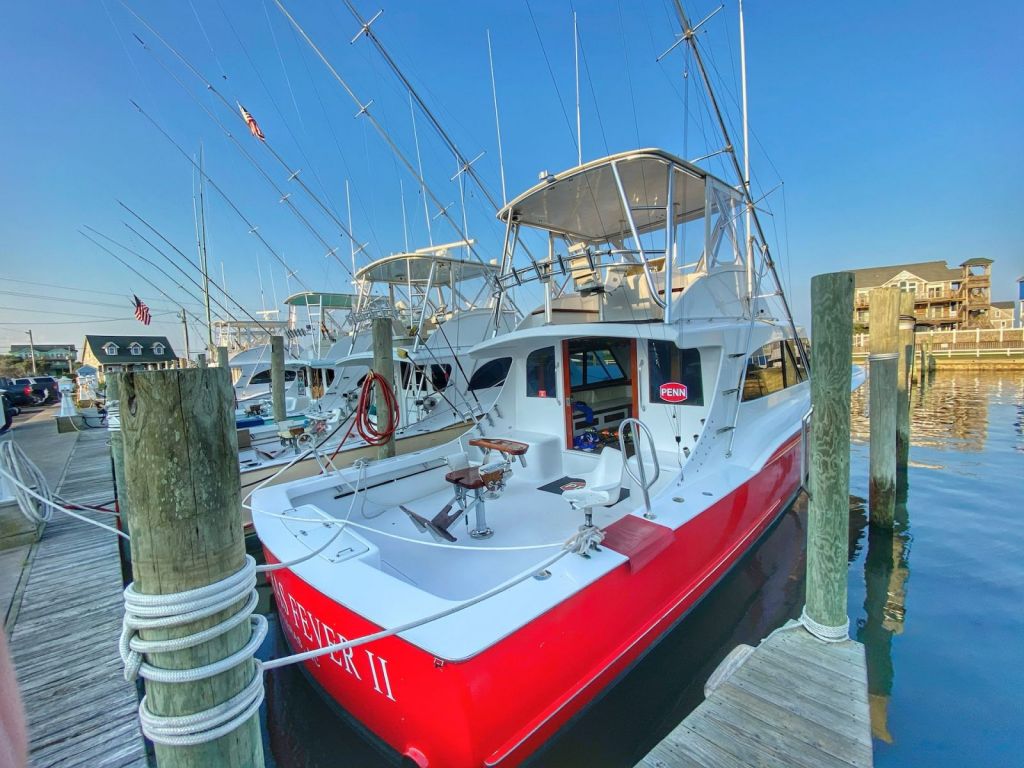Is a Boat Slip Real Property? (FL, NC, TX, SC, MO)
Navigating the world of real estate can be tricky, especially when you're dealing with specialized properties like boat slips. If you're wondering whether a boat slip is considered real property, the answer isn't exactly straightforward, as it may vary depending on factors such as local laws and regulations. It's important to understand the specific rules governing boat slips in your jurisdiction—Florida, North Carolina, Texas, South Carolina, or Missouri.
In a private letter ruling, the IRS concluded that boat slips can be considered real property assets for REIT purposes. In some cases, boat slips may be attached to real property through riparian rights, which involve the connection between water and land ownership.
The classification of a boat slip as real property can have implications for taxes, property assessments, and potential legal disputes. To better understand how your boat slip might be classified and ensure that you are properly abiding by the relevant rules and guidelines, let's look at specific laws and regulations in your state.
Summary
- In Florida, boat slips are generally considered to be real property and are subject to the same property rights and laws as other types of real estate.
- In North Carolina, boat slips are considered personal property rather than real property.
- In Texas, boat slips are considered real property only if they are attached to the land. If a boat slip is not attached to the land, it is considered personal property.
- In South Carolina, boat slips are generally considered to be real property.
- In Missouri, boat slips are generally considered personal property rather than real property.

On this page:
Boat Slip as Real Property in the US
When it comes to determining whether a boat slip is considered real property, it's essential to consider the specific laws and regulations within each state. In the United States, different states have their own guidelines and legal parameters that dictate how boat slips are classified. The states of Florida, North Carolina, Texas, South Carolina, and Missouri are no exception.
In some states, a boat slip might be viewed as real property, especially if it is permanently attached to the land or a dock. This would imply that the boat slip is considered an extension of the land it's connected to. However, this isn't always the case. There are instances where a floating dock that is not permanently attached to real property, might not be considered real property, as discussed in this legal inquiry.
An example of a case in which a marina's floating docks were considered real estate assets for REIT (Real Estate Investment Trust) purposes can be found in this IRS ruling. This indicates that the classification of a boat slip as real property can vary depending on the situation and circumstances.
When trying to determine if your boat slip is real property or not, it's always best to consult with an authoritative legal or governmental source within the state where the boat slip is located. For example, in Florida, you might want to consult the Florida Department of Revenue's guidelines on real property. In other states like North Carolina or Texas, you could check with the respective state's Department of Revenue or the Attorney General's office for more information on the classification of boat slips.
Boat Slip and Real Property in Florida (FL)
In Florida, boat slips can be classified as real property under certain circumstances. A key factor in determining whether a boat slip is real property is the type of ownership involved. For instance, if you own a boat slip as part of a condominium association, it would likely be considered real property, while a leased boat slip from a marina is typically not considered real property because the boat owner does not own an exclusive right to use the slip.
When it comes to taxes in Florida, if you bring a boat into the state that has not had sales or use tax paid on it, the boat will not be subject to Florida use tax as long as it remains in a registered facility that rents dockage or slippage for a period not exceeding a total of 20 days in any calendar year.
In terms of dock permitting, Florida state laws require that all activities be set back a minimum of 25 feet inside riparian lines. There are a few exceptions to this rule. To stay compliant with Florida regulations, it is essential for you to be informed and aware of all state-specific laws that may impact your boat slip and its classification as real property.

Boat Slip and Real Property in North Carolina (NC)
In North Carolina, whether a boat slip is considered real property depends on its nature and how it is being sold. If the boat slip is being sold separately as personal property and not in connection with other real estate, then it is best to use the Agreement and Bill of Sale of Personal Property (Form 320-T). Ensure that a detailed description of the boat slip is provided in the document.
Regarding waterfront rights, boat slips in North Carolina are subject to the Public Trust Doctrine. This doctrine ensures that the public can enjoy unobstructed navigation for pleasure or profit on all watercourses that are deemed navigable. The rule adopted in the state is that any watercourse that is navigable in fact is considered navigable in law.
Regarding taxes, the statewide sales tax rate on boats in North Carolina is 3%, with a maximum tax of $1,500. Additional local and transit sales taxes do not apply to boat purchases. Personal property tax applies to boats, jet skis, boat motors, aircraft, hot air balloons, mobile homes, and other unlicensed vehicles. More information on boat-related taxes in North Carolina can be found on the NCDOR website.
When dealing with boat slips in North Carolina, it's essential for you to be aware of these state-specific laws to ensure proper classification, ownership, and tax considerations.
Boat Slip and Real Property in Texas (TX)
When it comes to boat slips in Texas, understanding whether they are considered real property can be a bit confusing. So here is some information to help you navigate this topic.
In the state of Texas, marinas and their floating docks are generally considered real estate assets, according to a ruling by the Internal Revenue Service (IRS). This means that, for tax purposes, owning a boat slip in Texas would classify it as real property.
Additionally, when you rent a boat slip in Texas, the sales tax treatment depends on the rental terms. If you are renting a boat slip from an operator, it's not subject to sales tax. However, if you rent without an operator, you are required to pay sales tax on the rental amount.
It's important to keep in mind that laws and regulations can change, so always consult with a legal professional or a governmental office to get the most accurate and up-to-date information on real property classification and tax implications in Texas.

Boat Slip and Real Property in South Carolina (SC)
In South Carolina, boat slips can be considered real property under certain circumstances. Understanding the distinctions and local laws can help you navigate the legalities of owning or leasing a boat slip in the state.
South Carolina has specific laws regarding the classification of boat slips or docks as real property. For instance, according to a legal expert, boat slips in South Carolina usually work in two different ways: either the slip owner owns the physical space under the water, or the owner has rights to use the space, while the marina has an easement to access the water.
It's essential for you to examine your specific situation to determine whether your boat slip is considered real property or not. Furthermore, if you're considering buying or renting a boat slip, it's wise to consult with a local attorney experienced in South Carolina real estate law, as they can provide you with valuable guidance on these matters.
Boat Slip and Real Property in Missouri (MO)
In Missouri, a boat slip can be considered real property according to Missouri State Law (HB 1692/RSMo 339.503). This amendment occurred in August 2010, changing the landscape for real estate appraisers and people who own or wish to buy a boat slip in Missouri.
A key feature of this amendment is that if a boat slip is considered real property in Missouri, it affects how you can finance the construction of a boat dock. For instance, in your situation, the classification of a boat slip as real property may allow you to finance the construction with a home loan. This legal recognition may provide you with more financial flexibility when acquiring a boat slip in Missouri.
It's essential to familiarize yourself with the specific definitions and guidelines provided by Missouri State Law § 339.503 to better understand your rights and requirements as a boat slip owner or buyer in Missouri.
Missouri does recognize boat slips as real property, and it’s important to be aware of the state-specific laws that govern their ownership, financing, and transfer. By understanding these regulations, you can make well-informed choices for your boat slip needs in Missouri. Remember that it's always a good idea to consult a local real estate or legal professional for the most accurate and up-to-date information.

Disparities of boat slip property laws
Maritime law is a complex area of law that governs activities and transactions that take place on navigable waters. Each state has its own set of laws and regulations regarding boat slip ownership, and these laws can vary significantly from state to state.
In Florida, boat slips are generally considered to be real property and are subject to the same property rights and laws as other types of real estate. This means that boat slip owners have the right to sell, lease, or transfer their boat slips just like they would any other piece of real estate.
In North Carolina, boat slips are considered personal property rather than real property. This means that boat slip owners do not have the same property rights as they would if their boat slip were considered real property. Instead, boat slip owners in North Carolina are typically subject to the same laws and regulations that govern personal property, which can be more restrictive than those that apply to real property.
Texas has a unique set of laws regarding boat slip ownership. In Texas, boat slips are considered real property only if they are attached to the land. If a boat slip is not attached to the land, it is considered personal property. This means that boat slip owners in Texas may have different property rights depending on whether their boat slip is attached to the land or not.
In South Carolina, boat slips are generally considered to be real property and are subject to the same property rights and laws as other types of real estate. This means that boat slip owners have the right to sell, lease, or transfer their boat slips just like they would any other piece of real estate.
In Missouri, boat slips are generally considered personal property rather than real property. This means that boat slip owners in Missouri do not have the same property rights as they would if their boat slip were considered real property. Instead, boat slip owners in Missouri are typically subject to the same laws and regulations that govern personal property, which can be more restrictive than those that apply to real property.

Here are some steps to consider if you find yourself in a boat slip property dispute:
Understand the legal issues: It's important to understand the legal issues involved in your case before taking any action. This may involve researching local laws and regulations, reviewing contracts and agreements, and consulting with legal experts.
-
Consider alternative dispute resolution: Before pursuing legal action, consider alternative dispute resolution methods such as mediation or arbitration. These methods can be less costly and time-consuming than traditional legal proceedings and may be more effective in resolving disputes.
-
Hire an experienced attorney: If legal action is necessary, it's important to hire an attorney who has experience in boat slip property disputes. Look for an attorney who has a track record of success in similar cases and is familiar with local laws and regulations. Look for an attorney who has experience in this area of law and has a track record of success in similar cases. It's also important to choose an attorney who is responsive and communicative, and who will keep you informed throughout the legal process. Finally, make sure that you feel comfortable working with the attorney and that you trust their judgment and advice.
-
Gather evidence: In order to build a strong case, it's important to gather evidence to support your claims. This may include contracts, agreements, photographs, witness statements, and other relevant documents.
-
Prepare for trial: If your case goes to trial, it's important to be prepared. This may involve preparing witnesses, drafting legal briefs, and developing a strategy for presenting your case in court.
Did you find the answer to your specific question?
👍 0 👎 0




Leave a comment